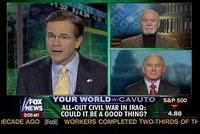
New and extraordinary evidence that Donald Rumsfeld was pushing to tie Iraq to 9/11 immediately after the event - whether such ties existed or not. Department of Defense staffer Stephen Cambone took notes during meetings with Rumsfeld on the afternoon of September 11, 2001. Here's some of what he wrote:
"[b]est info fast . . . judge whether good enough [to] hit S.H. [Saddam Hussein] at same time - not only UBL [Usama Bin Laden]"No shit, Sherlock.
"Go massive . . . Sweep it all up. Things related and not."
"Hard to get a good case."
Anyone still doubting this administration manufactured consent for the war?
(Via the the inimitable Andrew Sullivan)
Elsewhere, National Review founder William F. Buckley bluntly declares "One can't doubt that the American objective in Iraq has failed."
Nothing but utter silence in response from the folks now running the Review.
Update: And let's not forget Francis Fukuyama, who now says:
As we approach the third anniversary of the onset of the Iraq war, it seems very unlikely that history will judge either the intervention itself or the ideas animating it kindly. By invading Iraq, the Bush administration created a self-fulfilling prophecy: Iraq has now replaced Afghanistan as a magnet, a training ground and an operational base for jihadist terrorists, with plenty of American targets to shoot at. The United States still has a chance of creating a Shiite-dominated democratic Iraq, but the new government will be very weak for years to come; the resulting power vacuum will invite outside influence from all of Iraq's neighbors, including Iran. There are clear benefits to the Iraqi people from the removal of Saddam Hussein's dictatorship, and perhaps some positive spillover effects in Lebanon and Syria. But it is very hard to see how these developments in themselves justify the blood and treasure that the United States has spent on the project to this point.He concludes with words I agree with almost completely:
Neoconservatism, whatever its complex roots, has become indelibly associated with concepts like coercive regime change, unilateralism and American hegemony. What is needed now are new ideas, neither neoconservative nor realist, for how America is to relate to the rest of the world — ideas that retain the neoconservative belief in the universality of human rights, but without its illusions about the efficacy of American power and hegemony to bring these ends about.I would make this point though: a belief in "the universality of human rights" is hardly unique to any strain of the conservative movement. Human rights shouldn't be a left/right issue, even if in practical terms they often are. Having said that, when conservatives finally and unequivocally accept that gays rights are human rights, too, I'll probably find the idea of a neoconservative belief in "the universality of human rights" a little more feasible.
No comments:
Post a Comment